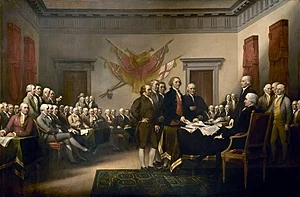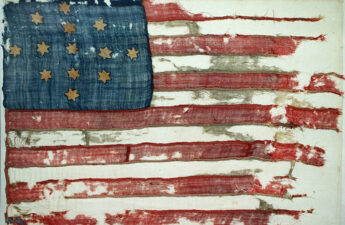We hold these truths to be self-evident, that all men are created equal, that they are endowed by their Creator with certain unalienable Rights, that among these are Life, Liberty and the pursuit of Happiness. – Thos Jefferson, Declaration of Independence, July 4, 1776
“No person shall be deprived of life, liberty or property without due process of law” –5th Amendment to US Constitution, 1791
Thomas Jefferson wrote those famous lines about unalienable rights to “life, liberty and the pursuit of happiness”, which, as I’ve often told, caused Soviet professors to cry when I read it to them at a birthday gathering in Dec, 1991. Jefferson borrowed that line from John Locke’s 1693 Essay Concerning Human Understanding, only he dropped Locke’s “property” and inserted “happiness” instead. Then later, “property” was reinserted into our Constitution in the Bill of Rights (the 5th Amendment) which caused all that Federalist and Anti-Federalist kerfuffle eleven years later in the 4-year process of getting the Constitution ratified. The Bill of Rights were what sealed the deal.
“Private Property”, if you don’t know, is a big deal with every human being on earth outside the few remaining tribal peoples in Amazonas, plus a few surviving hippies now in their late 70s still squatting in canyons in central Arizona, but who carry guns anyway.
The relationship between guns and private property is as easy to understand as the necessity for a male to join with a female in order to bring forth a child and “procreate the species”, a natural survival instinct in all animals, and which predated marriage by thousands of years.
Romance was not injected into this process until several hundreds ago. No one knows for sure. Some say Shakespeare first added the romantic element to this mating process with his plays, which a hundred or so could watch in a small theatre near London, and aimed more or less toward the upper classes. Others maintain it was America with Frank Sinatra, the Pied Pipers and Tommy Dorsey Band, which millions of Americans could listen to simply by popping a nickel in a juke box in the years just before World War II.

That idea of having a free nickel laying around in one’s pocket, especially a young 16-year old’s pockets, who either got it from his dad, or washed windows to earn it, brings us right back to this idea about “property” and the novel, untried idea that just by being able to acquire it and protect it, the whole world, not just the nobility, could be enriched to the point even the lower classes could afford an extra nickel to pop into a machine and groove to the sounds of Jo Stafford and Sinatra, while sharing a milk shake with two straws with a pretty young lassie in Hoboken.
There are those around the world who still today believe that giving the lower classes this kind of access to “recreational spending money” is a bad idea. I’ll let you sort that out for yourselves,
But the protection of the Law comes in a distant second in protecting a person’s right to acquire, possess and keep “property”.
The reason why private property is so important to humans everywhere is because land and houses, (and at one time, even the shirts on their back and the hoes they used to till their gardens) is the one thing Man was never allowed to own throughout most of his history in this world.
This is a fact that almost no one even knows, let alone considers anymore.
Hard to imagine, I know, but the “idea” of private property is one of the primary shoulders Americans have always stood on, and because we started this fashion, most of the rest of the world now does at least a little.
It started in England with the Magna Carta although that wasn’t the original purpose of that agreement between King John and some of his barons who were about to rise up against John, who was a weak, feckless king, because he was causing them to lose plenty of their own soldiers (knights) in a running war John had going on with France. John was that little weasel king in the Robin Hood fables popular all the way into the days of Walt Disney, but which had a leg of truth in them for John’ craven behavior caused him to send in troops to shake-down English farmers to pay for his wars. (This also proves why even 800 years ago legends had more staying power with the people versus the official version by the government. And still do.)
At the time America was first settled in 1607, all of Europe, actually the whole civilized world, was “owned by fewer than a few hundred kings and their barons, while the rest of the world, South and North America, were “claimed” by those same kings in Spain, Portugal, France and England, with most of those areas actually administered by their various Church affiliates. (At that time most kings still couldn’t read very well, preferring falconry, only that’s another story, but they did have their entourage of priests to take care of all their paperwork.)
But England was mostly an exception, having begun going its own way because of that Magna Carta in 1215, only not in the ways originally intended, for it accidentally let the “serfdom” (slavery) cat out of the bag, with some of the barons granting freeholds to some farmers just to keep the peasants quiet. That led to privately-owned freeholds by farmers, and although future kings would still claim that “Divine Right” from time to time, and try to get that cat back into the bag, the English Common Law and civil courts, dealing in property rights such as contract and trespass, and boundary disputes, would continue to grow and the absolute rule of English kings was anything but absolute.
The first 70 years of the American colonial history was no ordinary time, what with the split between England and the Catholic Church, and the Protestant Reformation widening that gap even more, eventually leading up to the English Civil War in the 1640s, and the ultimate beheading of of the Catholic king Charles I in 1649, just 40 years after Jamestown was founded. By that time all the colonies from Virginia north, except Pennsylvanie had more than one permanent settlement. England won New York (New Amsterdam) from the Dutch in a war in 1669.
America had been settled in this period, and while most of the territories and towns were named after prominent British monarchs, Virginia for Elizabeth ! actually being the original name for all of English territory from Maine to Florida until later settlements sliced it up. The Carolinas were named after King Charles II and Jamestown after Charles II’s grandfather, James I, the first Stuart Monarch and who gave us the King James Bible.
Just for fun you might draw for yourselves parallel timelines of the early exploration and settlement of the American coastline, beginning with Queen Elizabeth I and Sir Walter Raleigh who founded the first colony, in Roanoke Island, in 1587. There were two failed attempts there, including the famous “Lost Colony” while Elizabeth still lived (until 1603) and then Jamestown was founded in 1607 after James I, the first Scottish (Stuart) king ascended the throne, succeeding Elizabeth because she was, well, a virgin, or at least without issue, as still other stories go…and England’s monarchy flipped from Anglican to Roman Catholic. A lot of things going on there that affected the make-up of the early American colonies, that you may not have considered.
Comparing the settling of the American east coast with the rest of the New World is instructive, for unlike the British Hudson’s Bay Company, which was founded in 1670 to contest France’s fur monopoly in Canada, and was a company chartered by the King of England, the American colonies were not organized with any kind of grand commercial purpose. No one envisioned a million dollar business line. Cotton was not a big-dollar business until 1792, with the advent of the cotton gin. Nor tobacco. That immigrants to America in the early 1600’s came in part because genuine religious “terror” existed in England after the death of Elizabeth in 1603, while later, the Scotch-Irish, who settled western Virginia and the Carolinas came mostly for property.
Land.
The Declaration of Independence and resulting American Revolution would be about both, as noted above. But it would take nearly another century for the ordinary people of the rest of the world to know that such a place where people could own property just by staking a claim to it and making it prosper actually existed. Oh, their leaders, mostly kings, and their prime ministers knew, but it was not something kings wanted their people to know.
But they did. If I were young enough I’d make it my life’s goal to write a history of the world’s tom-tom network, but there is no written history of it, yet it involves several principle, scientific, philosophic and political, all of which ends up in scuttlebutt or idle talk of sailors and sea merchants who pick up talk along the docks, or dealing with tradesmen, or tradeswomen, (if you know what I mean) and as they sit upon a sailor’s knee and share a pint.
The larger lesson in doing this simple exercise is that you will learn that even though Nature has it’s own sets of laws about How Things work over which it has absolute authority, Man can and will bollix things up simply by fighting and killing one another over “how they think things ought to work” when the outcome is predetermined. Man’s search for religious freedom, choice, leaving any final judgment to Nature or God (your choice) to decide that final outcome. The same is true of Man’s innate pursuit for both “Happiness” and “Property”. Simple rules of harmony, about which Nature totally approve. Even old stoned hippies in Arizona agree. I know, I’ve asked.
True, allegiance was still owed the king, but a body of law, called the English Common Law, which was three centuries in advance of any sort of laws on the Constitution.
By the time of John Locke, a century after the English Civil War, an entire body of thought about property rights would be a common subject of talk in Parliament, still dominated by the House of Lords, while its was still not even a glimmer in the eyes of France or Spain, or the German and Italian states.
Property had everything to do with the manner by which the first English settlers approached acquiring land when they settled the Atlantic coastal areas of what are now the US east coast. It would be 1776, which that Declaration of Independence so well laid bare, that the royal houses of all of Europe and their worldwide colonies would quickly realized was the greatest threat to their place in their own countries, and in the world…that all their people too would want a little piece of land all their own. Property.
Thus endeth the lesson on Property…almost.
The Education moves on.




